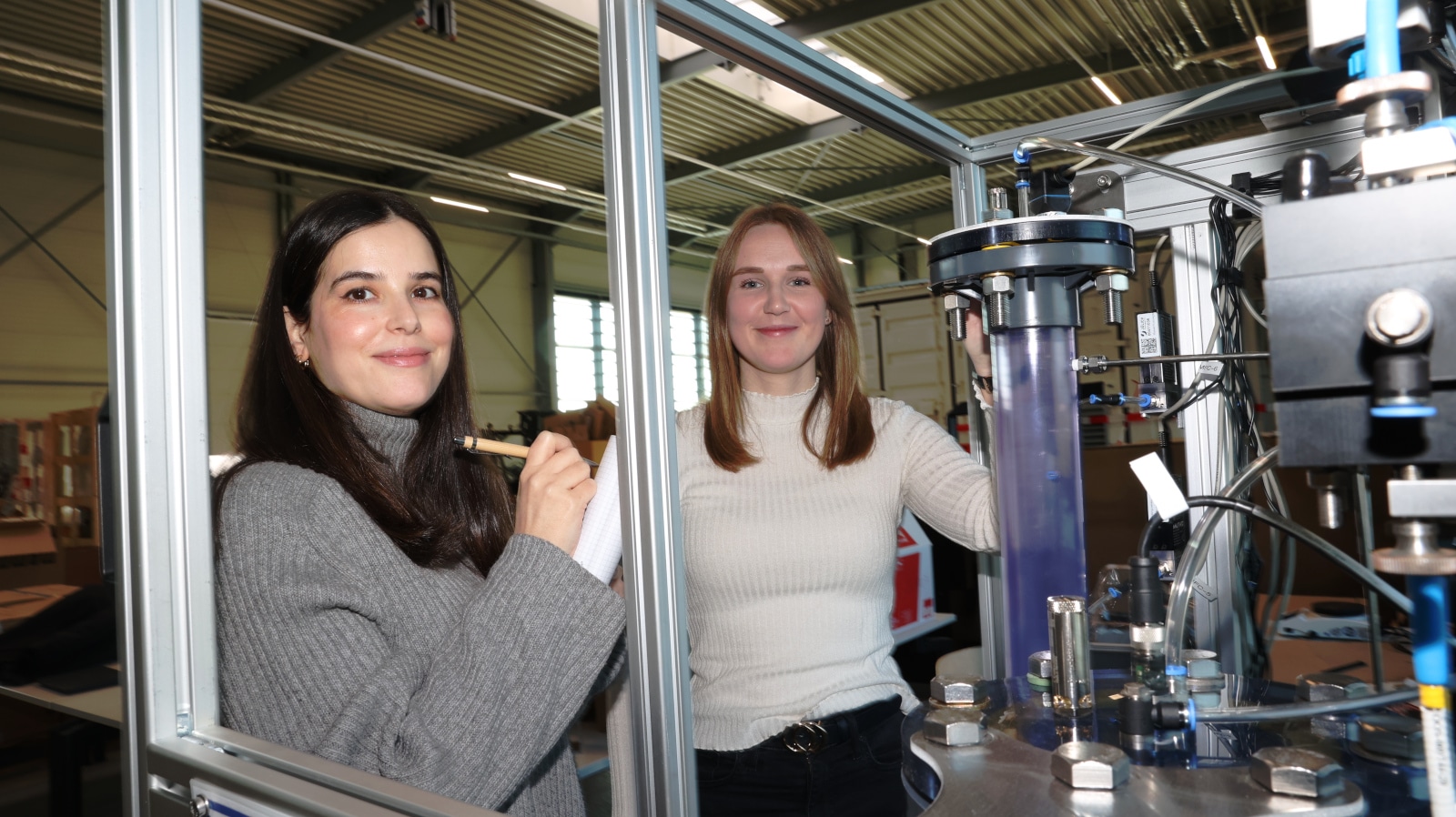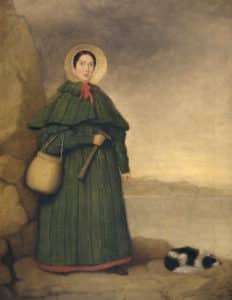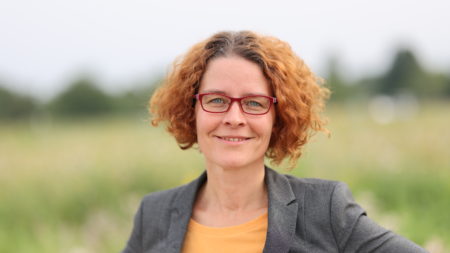World Day of Women and Girls in Science

Amparo Gonzales Castano (left) and Luisa Failing are doctoral researchers at the Institute for a Sustainable Hydrogen Economy.
Photo: Research Centre Jülich/Jansen
Luisa Failing and Amparo Gonzales Castano are doctoral researchers at the Institute for Sustainable Hydrogen Economy (INW) at Forschungszentrum Jülich. On the occasion of World Day of Women and Girls in Science on 11 February, the two young women describe something that is normal for them, but perhaps not yet taken for granted in general: namely that their gender does not matter in their working environment.
Luisa Failing and Amparo Gonzales Castano didn’t know who Mary Anning was until recently. This is because the two young scientists at the Helmholtz Cluster for Sustainable and Infrastructure-Compatible Hydrogen Economy, which is supported by the INW, live and work in completely different times and in a completely different field of research than one of the most important dinosaur hunters in history. Anning searched for and found many groundbreaking fossils.
Because of this, but above all because she did this during a lifetime (1799 – 1847) in which the words woman and science were a seemingly insurmountable paradox, she became famous as a pioneer who was misjudged and ridiculed at the time and is now recognised beyond all doubt in specialist circles.
Gender equality as normality
Today, 200 years later, the world of science is a different place. Luisa Failing and Amparo Gonzales Castano may belong to a generation of young female researchers who no longer have to constantly fight for equal treatment. Gender equality is normality for them. They talk about this on the occasion of “World Day of Women and Girls in Science”, which takes place every year on 11 February. This is because the two doctoral students work in an environment “where it doesn’t matter what gender you are. The important thing is that you are qualified and motivated,” says Luisa Failing.
According to the two of them, reservations against them as women and researchers are only rudiments of a bygone era. And not in their professional environment, but on a private level. When it happened once, she was offended because she found a friend’s comment inappropriate. “He said, after I told him about my opportunity to do a doctorate, that my biological clock would start ticking at some point,” she says and still smiles about it today. She was 24 at the time and is now 25. “Instead of congratulating me on my new job, he commented on a topic that was none of his business.”

Mary Anning from Lyme Regis, Dorset, a pioneer of palaeontology. Oil painting by an unknown artist, before 1842, kept in the Natural History Museum, London.
Pioneers in their own way
The two Jülich hydrogen researchers have one thing in common with the pioneer of palaeontology: they are all pioneers in their own way. Even if they didn’t, or don’t, feel that way. In the male-dominated world of the early 19th century, Anning was always labelled an outsider. No matter how good she was and how ground-breaking her discoveries were.
For a long time, Luisa Failing and Amparo Gonzales Castano did not even realise that they were the first female scientists at the Institute for a Sustainable Hydrogen Economy (INW) at Forschungszentrum Jülich. On the one hand, this was due to the fact that the INW, which forms the core of HC-H2, is still being established as a young institute and the two doctoral students joined relatively early in 2023.
“On the other hand, here in our team I’ve never had the feeling that it matters that I’m a woman,” explains Amparo Gonzales Castano. What she perceives is a culture of openness and mutual support in a young team. This is a good breeding ground for the fight against global warming. “And in the end, it doesn’t matter who makes progress or what gender that person is. The main thing is that progress happens.”

11 February is the UNESCO World Day of Women and Girls in Science.
Photo: Sergey Nivens/Fotolia
Progress as motivation
This search for progress was the motivation for both women to pursue a career in science. “After completing my bachelor’s degree, I worked for several large companies in Spain. But that didn’t really fulfil me. I wanted to do something where I could see an opportunity to make a contribution,” says Amparo Gonzales Castano, explaining why she quit her job to take up a Master’s degree in renewable energies. Hydrogen and fuel cells were often the subject of her studies. That’s why the doctoral position that was advertised at INW at the end of 2022 fulfilled all her thematic wishes. “I am convinced that we can have an impact with our research,” says Amparo Gonzales Castano about her work at the INW.
(No) Search for the holy grail
No one will find the holy grail that will solve all problems at once. “But there are many different ideas that many researchers are working on. All in all, there are so many different opportunities to drive decarbonisation forward.” The woman from the small town of Albacete in south-east Spain is working on a dynamic model of all the components of a solid oxide fuel cell as part of her doctorate. With the help of the model, the team should later be able to optimise the system using simulations. Among other things, she is involved in the Multi-SOFC demonstration project at Erkelenz Hospital, which will officially go into operation in March.
Making a contribution to a better world also motivated Luisa Failing. She had a keen interest in making processes sustainable from an early age, which is why she did her A-levels specialising in environmental technology. Building on her bachelor’s degree in environmental and process engineering, she went on to study simulation and experimental technology for her master’s degree. Standing her ground as a woman in the sense of the outdated saying – that was not her motivation. “We are facing the greatest technical and social challenges to date, not just in Europe but worldwide. The goal of climate neutrality is definitely a great motivation for young researchers.”
The PhD student has been working on her doctorate at the INW since last year. Her topic is the challenges associated with coupling the fluctuating availability of solar and wind energy with the low flexibility of the synthesis plants for the hydrogen derivatives dimethyl ether and methanol. This is because the plants that synthesise dimethyl ether and methanol as storage for renewable energy take a relatively long time to start up or shut down. This clashes with the sometimes highly fluctuating availability of green hydrogen produced using solar and wind energy.
A role model in their own institute
Today, they are no longer the only female scientists at the INW. Several female team leaders now work at the INW and Prof Regina Palkovits is a highly renowned scientist as Director. In addition to her new position at INW, Regina Palkovits also holds the Chair of Heterogeneous Catalysis and Technical Chemistry at RWTH Aachen University. And she is the mother of two children.
She recently made headlines because she and her RWTH colleague Prof Jürgen Klankermayer won the competition for the Werner Siemens Foundation’s “Project of the Century”, which is endowed with 100 million Swiss francs. “She is definitely a role model. Her example makes it clear that you can go far if you are good. At least in the environment in which we work, it doesn’t matter whether I’m a man or a woman,” says Amparo Gonzales Castano. Luisa Failing nods in agreement.

Prof. Regina Palkovits sorgte unlängst für Schlagzeilen, weil sie das Jahrhundert-Projekt der Werner-Siemens-Stiftung gewonnen hat.
Foto: Forschungszentrum Jülich/Jansen
Interview with Regina Palkovits: “The Accelerator”
11 February is the International Day of Women and Girls in Science. Why do we need a day like this?
The right path
The two presumably do not realise that they are somehow part of a generation of female pioneers. After all, the fact that gender no longer plays a role in science is an achievement that is much more recent than the work of Mary Anning. It may even be that this way of thinking has yet to become established across the board. The fact that the World Day of Women and Girls is still a topic is evidence of this. However, the fact that Luisa Failing and Amparo Gonzales Castano are hardly aware of this shows that they are on the right track. That is why the two Jülich researchers’ advice to young people, regardless of whether they are women or men, is: “If you are passionate about a topic and want to make a difference, then go for it.”

